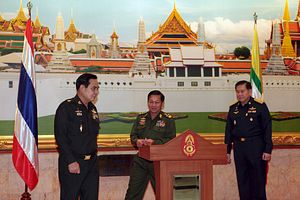The Thai military staged a coup on May 22, claiming to restore peace and order after months of protests against the elected government of Prime Minister Yingluck Shinawatra. In reality, it was a military scheme to take control of politics ahead of an uncertain royal succession. In the process, it destroyed democratic institutions and violated the people’s human rights.
Immediately after the coup, an army of Western countries voiced their concern about the disappearance of democratic space. Subsequently, they imposed “soft sanctions,” with the United States suspending its financial support for the Thai military and the European Union freezing all cooperation with the kingdom.
Amid international sanctions, the Thai junta has found some comfort in the warm embrace of China. Shortly after the coup, photos surfaced of Army Chief, General Prayuth Chan-ocha– who’s also serving as the interim prime minister– shaking hands with Chinese business owners, demonstrating the Thai tactic of employing China to counterbalance Western sanctions.
But China is not Thailand’s only friend in its time of need. On July 4, Myanmar Supreme Commander Senior General Min Aung Hlaing paid a visit to Bangkok, making him the first leader from the Association of Southeast Asian Nations (ASEAN) to meet the Thai junta after the coup.
He held a cozy discussion with Prayuth, purportedly to strengthen ties between Thailand and Myanmar. Disturbingly, Min Aung Hlaing praised the Thai junta for “doing the right thing” in seizing power. He also compared his country’s experience during the political upheaval that took place in Yangon in 1988, when the tatmadaw, or Myanmar’s army, launched deadly crackdowns against pro-democracy activists.
But Min Aung Hlaing’s relationship with Thailand is more than skin deep. He is the adopted son of Thai military supremo, General Prem Tinsulanonda, the former prime minister, army chief, and current president of the Privy Council. Prem, while still in the army, personally knew Min Aung Hlaing’s father. In 2012, Prem adopted Min Aung Hlaing as his son.
Min Aung Hlaing is a rising star in the tatmadaw and a possible candidate to be the next president of Myanmar. Meanwhile, Prayuth is likely to assume the premiership when the Thai government is formed in the next few months. The intimate ties between the two countries suggest a new alliance of quasi-democracies is being established in Southeast Asia.
Critics were too quick to celebrate Myanmar’s opening up process. In reality, Myanmar has yet to come out of the military’s shadow, with 25 percent of parliamentary seats still being reserved for army delegates. Opposition icon Aung San Suu Kyi is also barred from seeking the presidency, thus guaranteeing that the military will continue to dominate the country’s highest office.
Similarly, last week the Thai junta unveiled the interim constitution to the public. Immediately, critics complained that it seems to have been designed to further the military’s political role rather than promote democracy. Indeed, it seems that the Thai military has taken Myanmar’s constitution as a model, with Prayuth confirming that the military will remain a fundamental element in the new government. To be precise, the military as institution will be more powerful than the government.
Already, Prayuth has seriously undermined the democratic structure in Thailand by replacing a large number of senior bureaucrats with individuals close to the army, eliminating the pro-democracy red-shirt networks in the far-flung provinces, and recently scraping local elections to pave the way for candidates appointed by the military.
Gradually, the political interests of Thailand and Myanmar seem to converge. With the backing of China, the two largest states in mainland Southeast Asia have increasingly emerged as a large dark hole that could threaten democracy in the region. China has successfully made inroads into Myanmar, and now serves as Thailand’s legitimacy provider in defiance of international sanctions.
This quasi-democracy club will become a thorn in ASEAN’s community building, which will materialize by the end of 2015. Myanmar is this year’s ASEAN chair. Instead of urging the Thai junta to immediately reinstate democracy, Myanmar praised the coup in Thailand. The reverse of the political trend, from democracy back to authoritarianism, could tremendously undermine ASEAN’s Political and Security Community, whose key principle is upholding democratic values. In fact, the new alliance between Thailand and Myanmar could negatively affect peace and stability of the Southeast Asian region.
In a broader context, a new model of quasi-democracy cultivated in Thailand and Myanmar poses a menace to American interests in Southeast Asia. It is true that, in the game of international politics, the United States is nervous about China strengthening ties to the two Southeast Asian states. But the real long-term and sustainable interest for the U.S. is to consolidate democracy here as much as anywhere else.
Thailand is the United States’ oldest ally in Asia. The coup has shaped a new kind of comradeship between Thailand, China and Myanmar, and this comes at the expense of Bangkok’s relations with the United States. The United States and its democratic friends must rethink their strategies for restoring democracy in Thailand.
Heftier international sanctions represent one crucial option. Frequently, international sanctions are used as merely symbolic weapons. Indeed, Myanmar coped quite well with sanctions in the past. The international community must therefore find a more effective way to deal with the Thai junta. For example, sanctions should serve to disrupt Thailand’s place in the global supply chain since the country is highly dependent on global trade. This would harm big businesses in Thailand, which are currently supporting the financial interests of the junta.
The international community may also consider supporting a newly established “Free Thai Organization,” reportedly headquartered in California, which is a pro-democracy group formed by exiled members of the ruling Pheu Thai party, as a vehicle to undermine the legitimacy of the junta.
Pavin Chachavalpongpun is associate professor at Kyoto University’s Center for Southeast Asian Studies.

































